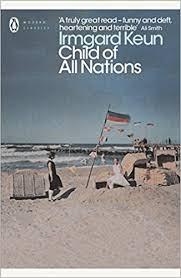Child of all Nations, by Irmgard Keun and translated by Michael Hofmann
I wrote up Child of All Nations as part of my recent May roundup post, but it was so good I thought it deserved a bit more attention. More accurately, it was so quotable I thought it deserved a few more quotes.

Child is narrated by Kully, an intelligent young girl with a handy gift for languages. Her father is a writer and a well-regarded one. Well-regarded in literary circles anyway, not so much in 1930s Nazi Germany.
He has to flee, which means his wife and their young daughter Kully have to flee too. The problem is, just because Germany doesn’t want them any more doesn’t mean anywhere else does. So they join that vast movement of refugees criss-crossing Europe, doing whatever they can to keep one step ahead of destitution and deportation.
My mother and I spend a lot of time sitting on benches. We open our mouths to let the sun shine into them; then we eat the sunshine, and our bellies feel full of warm happy life. My father didn’t feel like eating sunshine. He wanted to sit in the café Bazaar and drink slivovitz, which he finds more warming than any amount of sunshine.
Kully’s father, clearly modelled closely on Joseph Roth, is keen to maintain a certain lifestyle. He dreams of Hollywood adaptations and international recognition. In the meantime he spends the little money they have on a lifestyle he can’t remotely afford. Drink, women, café culture. His life still holds a certain shabby glamour while Kully’s is lit by her childish imagination. For her mother it’s a bleaker existence.
My mother didn’t want to play anything with me any more. Normally we play all the time. We play: how many beds have you slept in? Or: how many trains have you been on? … Three times my mother forgot a train from Prague to Budapest and a train from Lvov to Warsaw that we took with Manya. Then she forgot the bed in Bruges which was made of iron and had golden knobs, and where we had to lie so close that we didn’t know any more which was me and which was my mother.
The family travel from country to country. When they arrive they check into a hotel and eat in its restaurants. They rely on running up the hotel bill while Kully’s father tries to get money off whatever local contacts he can find. When the local contacts run out he leaves Kully and her mother behind, human collateral, while he ranges further afield in search of money to pay the bill with. To keep getting away with it they have to maintain a certain level of appearances or the hotels won’t let them run up those bills, but there’s a sense that they’re running out of road.
Child narrators are high risk but here it works well. Kully doesn’t judge her parents. For her they are as much a part of the structure of the world as the sun or the sky. At the same time she sees them all too clearly. Her father is charming, but more concerned with his own comforts than his family’s wellbeing. At the same time it’s his mix of charm and self-regard that helps him persuade others to advance another loan or payment on account. What makes him a bad husband and father is what makes him able to provide at all. It’s a compelling portrait.
Kully’s mother has it tougher. While Kully’s father is off enjoying himself with friends and other women she has to stay back at the hotel with Kully. She has to keep Kully safe and entertained, gradually withdrawing from the public life of the hotel as the staff start to wonder if their bill will ever be settled. She’s clearly depressed. She has good reason to be. Kully meanwhile is aware of her mother’s fragility and so just as her mother protects her she tries to protect her mother.
Finally there’s Kully herself. Intelligent and funny enough to be an entertaining narrator, but not too precocious as to be incredible. She’s moved country to country so often she’s barely educated, but speaks several languages. As I read I doubted either of her parents would survive the war, but I thought Kully had a pretty good chance.
The book dips a bit in the final quarter when a trip to the US takes the book briefly beyond the claustrophobia of Europe, but it’s a minor failing in what’s otherwise a strong read. Based on this I think Keun deserves far greater recognition than she’s received so it’s good to see Penguin Modern Classics redressing that a little.
One last quote, simply because I can:
She ordered bouillabaisse, which is a kind of soup that’s made out of the Mediterranean; all the creatures in the Mediterranean float around it in a hard-to-identify way, and some of them of course are poisonous. When people have had enough of life, they can choose to die either by mushrooms or bouillabaisse, but in either case I think they have to order it specially from the hotel kitchen.
We live in another age of refugees and mass movements of people. Decades after the events Keun portrays here one might hope they’d find better welcomes. They don’t. Like much fiction of the 1930s Child remains depressingly relevant.
